Study Shows Following the Mediterranean Diet May Slow the Development of Alzheimer’s Disease
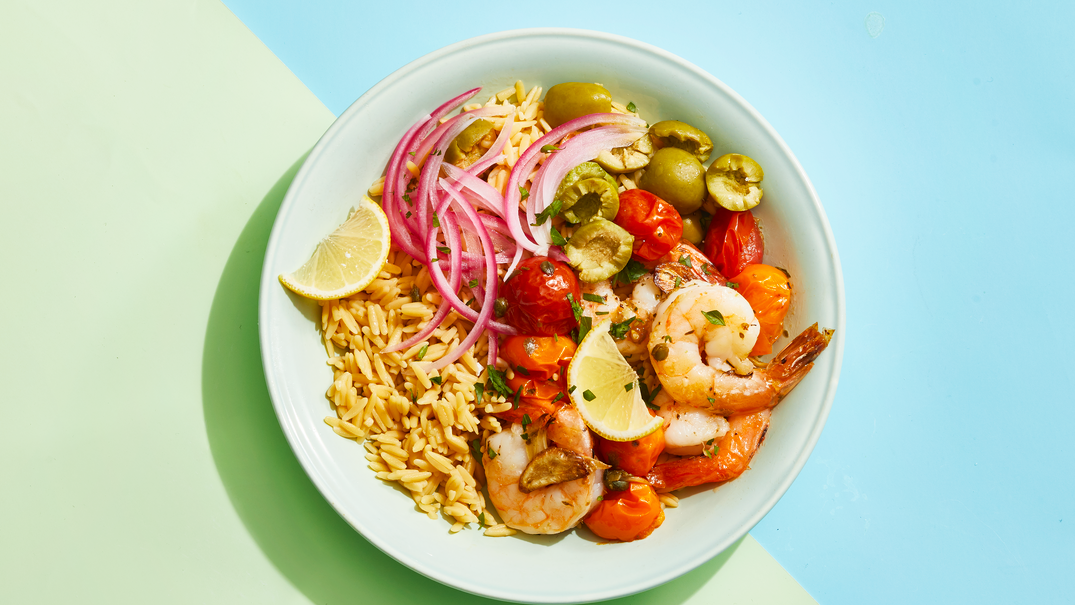
"Hearst Magazines and Yahoo may earn commission or revenue on some items through these links."
Sitting at a taverna enjoying a glass of wine, a delicious Greek salad full of the freshest veggies and a delectable piece of grilled fish as you stare into the Aegean Sea sounds totally dreamy—but even if you can't spring for airfare to Santorini right now, you can enjoy the health benefits of the Mediterranean-style diet, which is as good for your heart and brain as it is for your taste buds.
Years of research show that consuming a Mediterranean-style diet filled with fresh fruits, vegetables, nuts, whole grains, seafood and heart-healthy fats can help to reduce the risk of strokes and total cardiovascular disease, including heart disease. It may also help in the prevention of type 2 diabetes. In fact, year after year, it is named the top diet by leading weight-loss analysts at U.S. News & World Report and our own Good Housekeeping Institute Nutrition Lab dietitians.
What is the Mediterranean diet?
Not as much a "diet" as a way of life (there is no calorie-counting, hallelujah!), the Mediterranean diet originated from the lifestyle of the people who live in countries surrounding the Mediterranean Sea, including Greece, Italy, Spain and France. While there are certainly guidelines, there are no real rules or restrictions; instead the emphasis is on enjoying healthy fats and plant-based recipes with a moderate amount of dairy and minimal amounts of red meat, processed foods and added sugar.
This balanced and sustainable way of eating does not require you to meticulously track carbs or completely eliminate any of your favorite foods or beverages (moderate amounts of red wine included!). In addition to encouraging healthy eating, the Mediterranean diet also emphasizes incorporating daily physical activity into your routine.
Mediterranean diet health benefits
One of the key benefits of the Mediterranean diet is that it is anti-inflammatory and can help maintain healthy cholesterol and blood pressure levels, as well as support good gut bacteria. In 2013, a team of researchers at the University of Barcelona who studied more than 7,000 participants documented drastic improvements in their heart health. A more recent study also found that elderly people may vastly improve brain function and their own longevity by adopting the Mediterranean diet.
Some of the science-backed health benefits of the Mediterranean lifestyle include:
Reduced risk of heart disease. This eating plan includes plenty of delicious fatty fish, which is rich with heart-healthy omega-3 fatty acids. You'll also cut down on red meat, which is higher in saturated fat. According to the American Heart Association, consuming fish at least twice a week can decrease the risk of heart disease and stroke. Additionally, low-sodium diets, such as the Mediterranean diet, can help to prevent and/or control high blood pressure.
Reduced risk of stroke. The Mediterranean diet may help to reduce bad (LDL) cholesterol, which is associated with an increased risk of a stroke. The diet encourages healthy fats, such as olive oil, which is rich in monounsaturated fat and associated with lowering bad cholesterol (LDL), while limiting saturated fats, such as butter and margarine, which can raise LDL.
Decreased risk of type 2 diabetes. Research shows that following the Mediterranean diet can be helpful in preventing and managing type 2 diabetes because it may improve insulin sensitivity and overall gut bacteria, due to being high in fiber and anti-inflammatory foods and lower in added sugars, refined grains and non-starchy vegetables.
Cognitive decline prevention. If you want to keep your brain sharper and healthier through your senior years, this diet can help: It emphasizes plant-based foods that are naturally rich in vitamins, minerals, antioxidants and fiber, such as vegetables, grains, nuts, seeds, legumes and fruits. According to some studies, following this type of diet may slow the progression of Alzheimer's disease and can help to reduce the risk of dementia.
Weight management. While the main goal of this eating plan is to stay healthy, it can help you slim down or maintain a steady weight as well. A recent study found that following the Mediterranean diet may lead to a reduced risk of obesity and may help prevent weight gain and reduce the risk of increased weight circumference.
Reduced risk of overall mortality. Best of all, you may live longer! Studies show that overall mortality risk is decreased when the Mediterranean diet is combined with physical activity.
Mediterranean diet top food list
There's no magic ingredients or trendy food ideas here: As with almost every legitimate healthy diet, this one emphasizes whole grains, fresh produce, lean protein and heart-healthy unsaturated fats. Add to that plenty of fatty fish (especially salmon recipes) and generous servings of legumes, nuts and seeds, and you have an easy-to-follow way to plan three filling meals a day. To help you get started, here is a list of foods to consider eating on the Mediterranean diet:
Eat mostly
Vegetables: artichokes, arugula, avocado, beets, bell peppers, broccoli, cabbage, carrots, celery, cauliflower, cucumbers, eggplant, kale, leafy greens, spinach, tomatoes, potatoes, sweet potato, turnips, zucchini
Fruits: apples, apricots, cherries, clementines, dates, figs, grapefruit, melons, nectarines, oranges, peaches, pears, pomegranates, strawberries, tangerines
Legumes, nuts and grains: almonds, barley, buckwheat, bulgur wheat, cannellini beans, chickpeas, couscous, farro, fava beans, kidney beans, lentils, navy beans, oats, orzo, pine nuts, pistachios, quinoa, walnuts
Healthy fats and vinegars: apple cider vinegar, balsamic vinegar, extra virgin olive oil, red wine vinegar
Herbs and spices: allspice, basil, bay leaves, cinnamon, cloves, coriander, crushed red pepper flakes, cumin, dill weed, garlic powder, mint, nutmeg, onion powder, oregano, parsley, rosemary, sage, smoked paprika, sumac, thyme, turmeric, za’atar
Other essentials: olives, sesame seeds, tahini
Eat in moderation
Dairy and cheese: feta, goat and sheep cheeses, Manchego, Parmigiano Reggiano, ricotta, yogurt, eggs
Seafood and meat: chicken, fish, shellfish, red meat (lean cuts)
Drink
Stay hydrated by sipping on calorie-free beverages like water, seltzer, unsweetened tea and black coffee.
Enjoy an occasional glass of dry red or white wine.
Foods to limit on the Mediterranean Diet
Nothing is strictly off-limits on this plan, but there are certain foods that are higher in saturated fat, simple carbs, and sugar that you'll want to put on the “once in a while” list rather than every day. These include:
? Red meat
? Processed meat (sausage, cold cuts, bacon)
? Processed foods (shelf-stable cookies, chips, boxed mac-and-cheese, any kind of "nugget")
? Sugary beverages and candy
? Refined grains (white rice, white bread, pasta, crackers)
? Butter (use olive oil instead)
? Alcohol other than red or white wine
Snacks to eat on the Mediterranean Diet
If you like to nosh during the day, no worries: There are plenty of tasty snacks on this plan that include plenty of fiber and healthy fats to satisfy your mid-afternoon munchies:
? Hummus with baby carrots or cucumbers
? Salsa with jicama sticks
? Crispy chickpeas
? A handful of raspberries or blueberries
? A quarter cup pistachios
? Frozen grapes
? Avocado on whole-grain crackers
What to order when you eat out
It's easy to stay focused on this eating plan even when you go out with friends for dinner or hit the diner for brunch. Some smart ordering strategies:
? Order the seafood: Most every type of cuisine will have fish, shrimp, or scallops on the menu. Ask for it grilled, not fried,
? Pile on the veggie sides, and go for grains such as quinoa, brown rice, or farro.
? In a diner? Order a Greek salad or eggs cooked with tomatoes, peppers, spinach, and other veggies.
? Skip the bread basket, or ask for whole grain bread and dip in olive oil instead of slathering on the butter
Your 7-day Mediterranean diet meal plan
The registered dietitians at the GH Institute Nutrition Lab have made it easy to follow the Mediterranean diet by putting together this sample 7-day meal plan that emphasizes real, whole foods and limits ultra-processed ones, which tend to be higher in sodium, saturated fat and added sugar.
With these simple recipes, there's no calorie-counting or restrictive portion sizes. You can fill up on tons of veggies, fruits, whole grains and beans; enjoy lean proteins such as seafood, chicken and eggs; and indulge in sweets and alcohol.
Since a typical Mediterranean diet prioritizes the enjoyment of the dining experience, flavorful ingredients are at the forefront of these heart-healthy recipes, so you’ll never feel deprived. Here's how to get started on the Mediterranean diet, with nutritionist-approved ideas for breakfast, lunch and dinner.
Editor's note: Weight loss, health and body image are complex subjects — before deciding to go on this diet, we invite you to gain a broader perspective by reading our exploration into the hazards of diet culture. While the Mediterranean diet enjoys a rare level of widespread support from dietary experts, it's always best to consult with your healthcare provider before starting any new eating plan.
Day 1

Breakfast
You'll start off the day with a filling dish full of flavor, with this vibrant Shakshuka recipe, known as a staple breakfast dish throughout the Middle East. Serve with 2 slices of sprouted grain bread.
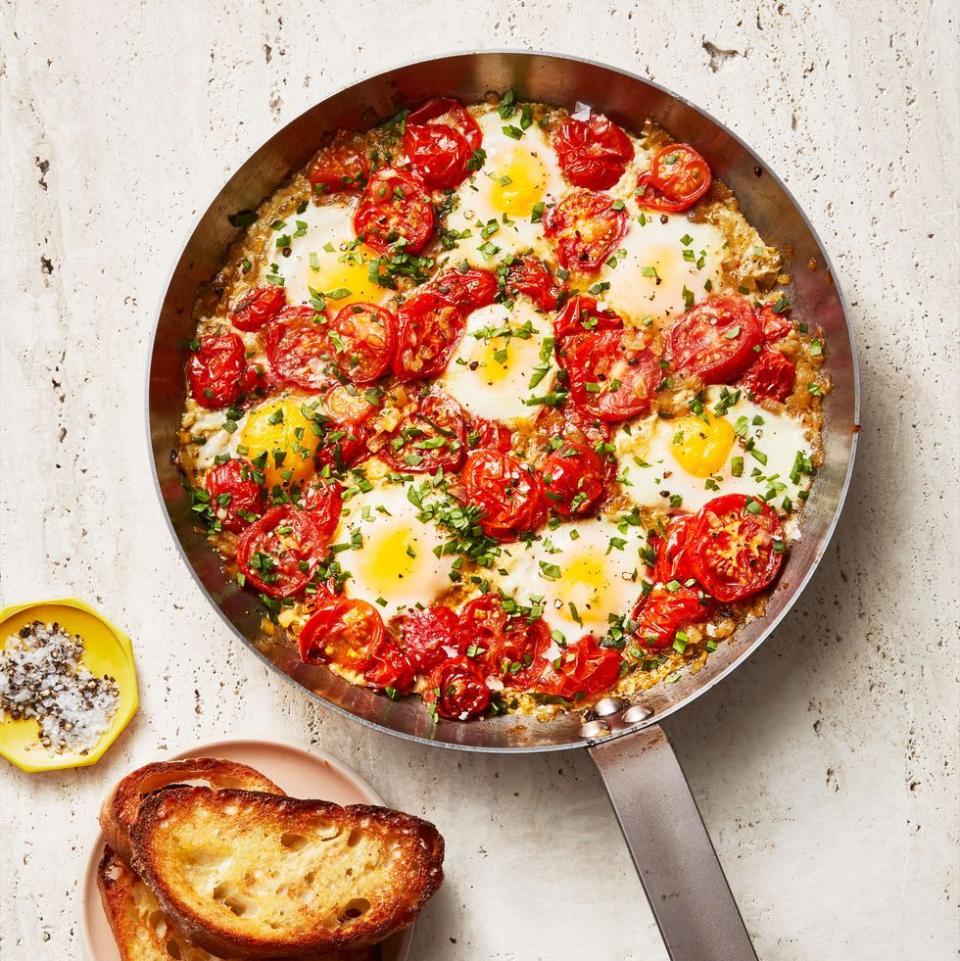
Lunch
In a bowl, combine 7.5 ounces (half a 15-ounce can) canned chickpeas (rinse in a colander for two minutes to remove excess sodium and drain well; save other half for tomorrow), 2 teaspoons olive oil, 1/4 cup chopped white onion, 1/4 cup chopped green pepper (save the rest of the onion and pepper for dinner), 1 tablespoon sliced black olives, 1/4 teaspoon ground black pepper, and 1.5 tablespoons white vinegar. Mix thoroughly. Serve mixture over 2 cups romaine lettuce leaves.
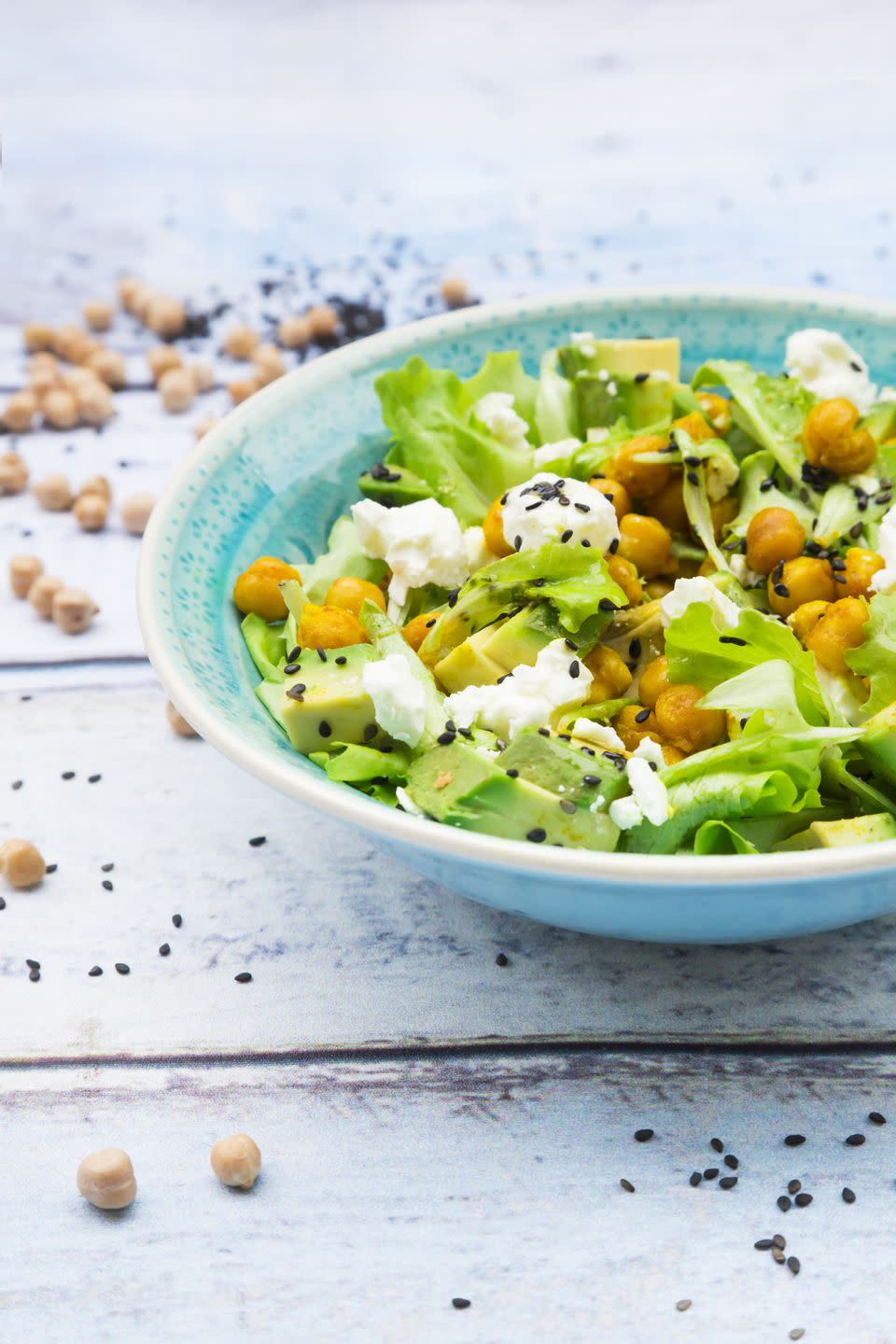
Snack
Get ready for a decadent yet healthy snack! Spread one slice of 100% whole-grain bread or 2 whole-grain flatbread crackers with 2 tablespoons homemade hummus, then drizzle with 1 teaspoon of olive oil, and add salt, pepper, or other seasonings to taste.
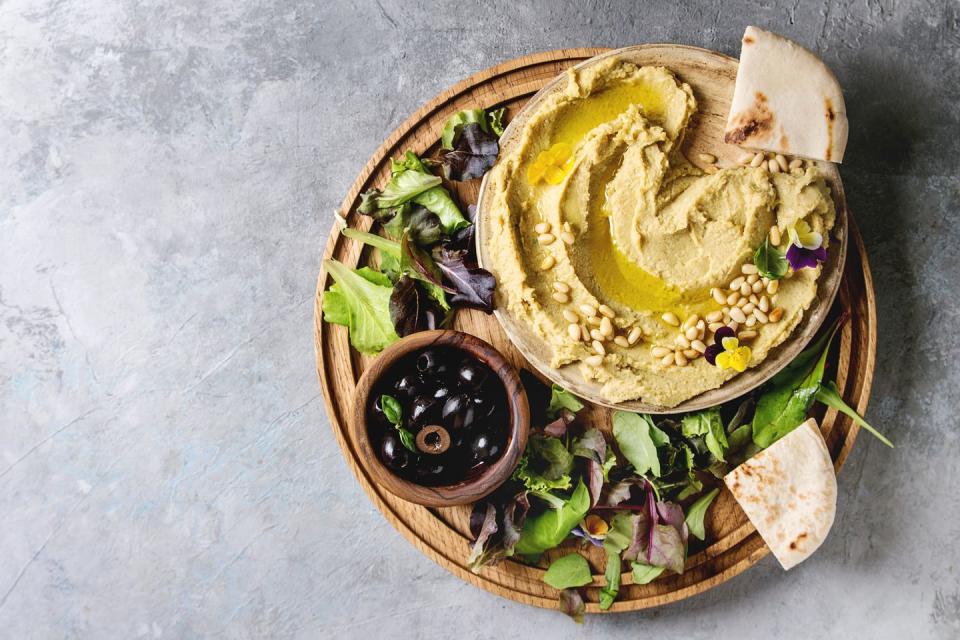
Dinner
Slice remainder of white onion and green pepper from lunch into chunks; set out 10 grape tomatoes. Alternate pieces of onion, pepper and cherry tomatoes on skewers and grill. Serve with 5 ounces of grilled salmon and one 6-inch whole-wheat pita pocket. Spread pita with 2 tablespoons hummus. Drink 1 cup fat-free milk.
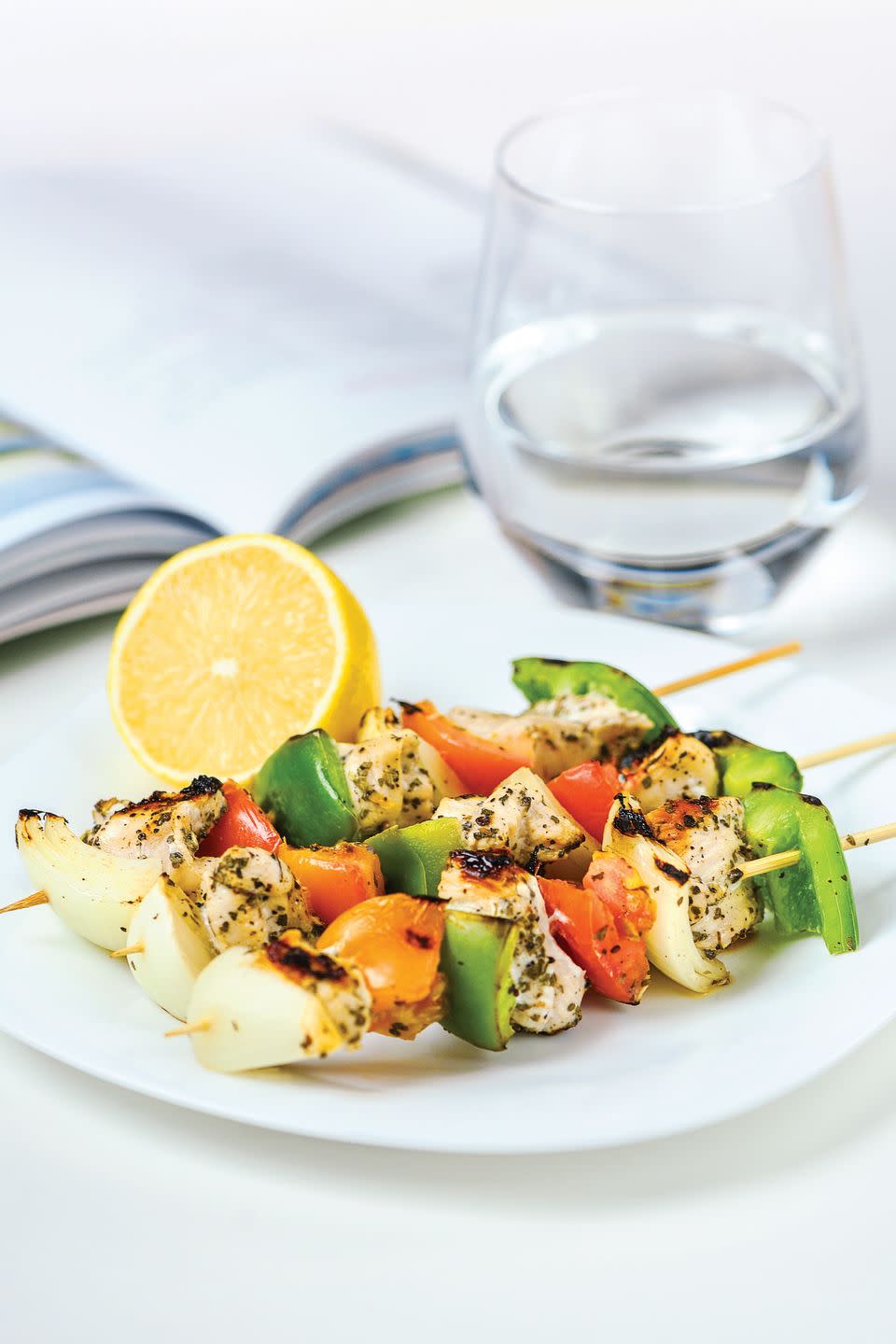
Day 2

Breakfast
This brekkie is as pretty as it is healthy: In a clear, wide-mouth glass, layer 1/2 cup 2% Greek yogurt with 1 cup raspberries and 1/3 cup lower sugar granola, such as KIND Dark Chocolate Clusters granola.
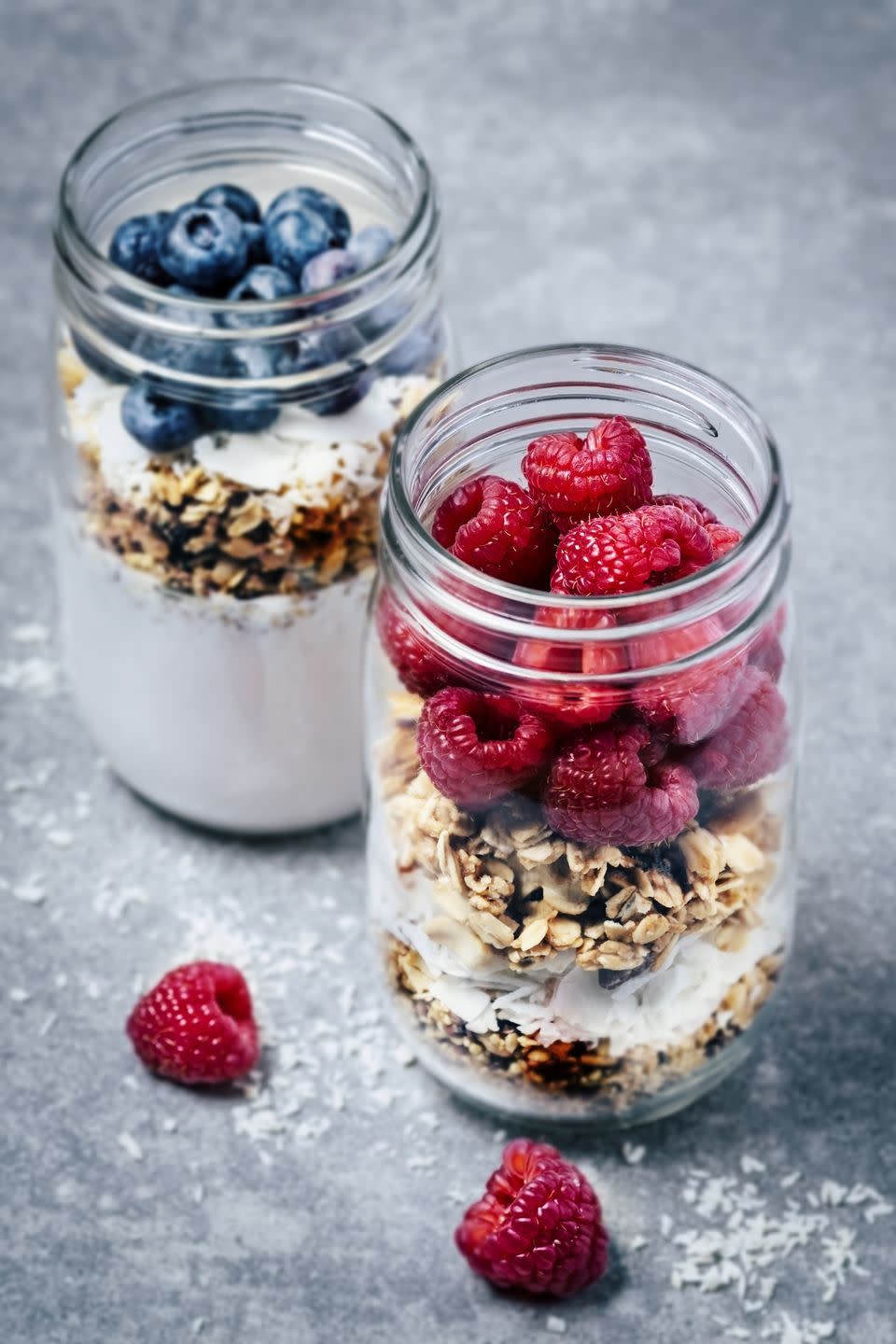
Lunch
This one is especially easy. if you're eating on the run: Eat one Freshé canned tuna pack (they come in flavorful varieties like Provence Ni?oise and Sicilian Caponata) with a piece of fruit.
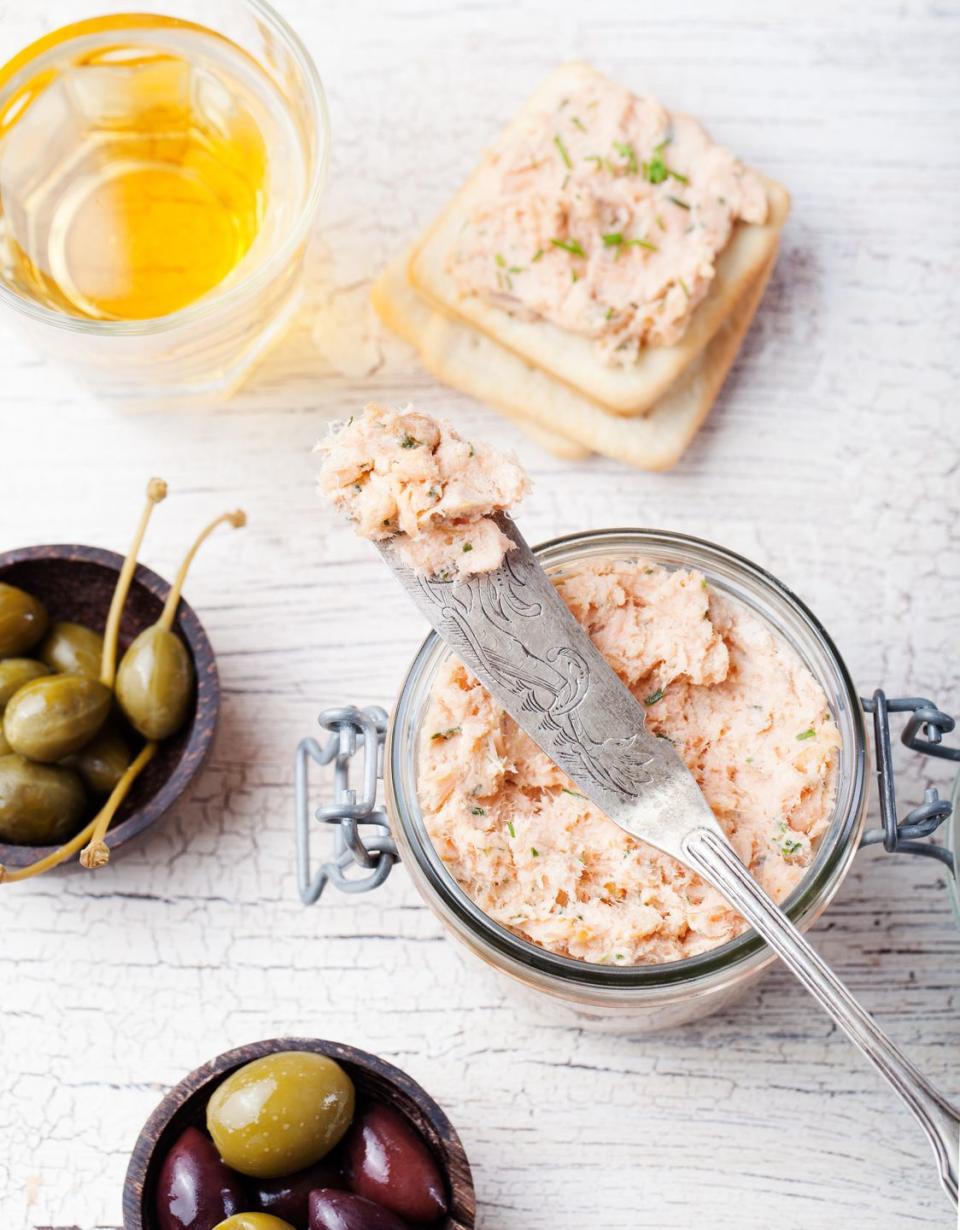
Snack
Make your own hummus in advance and have half the recipe today, then save the rest for tomorrow's snack (or top it with an egg for breakfast). Here's how:
Use remaining chickpeas from the first day's lunch (half a 15-ounce can). Mash the chickpeas lightly in a bowl with a fork. Mix in 2 teaspoons olive oil, 1 clove minced garlic, 1 tablespoon lemon juice, and 1/4 teaspoon salt. If desired, add 1/4 teaspoon ground cumin. Mash all ingredients together thoroughly or, if a smoother spread is desired, use a food processor to blend the ingredients. Bring along 1 cup broccoli florets and 1 sliced pepper for dipping.
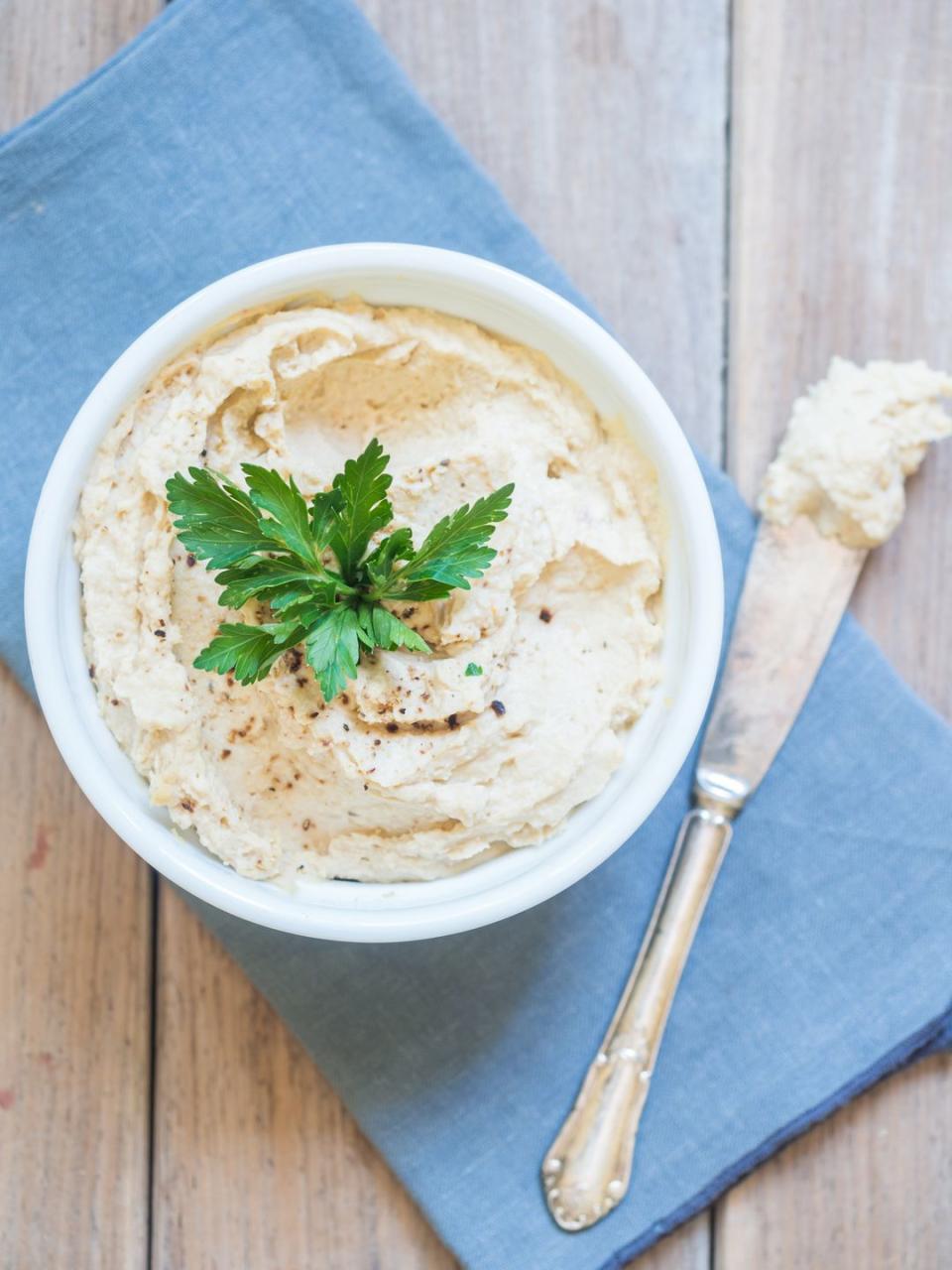
Dinner
Slice a 6-inch French baguette in half lengthwise. Sprinkle the halves with 1/4 cup shredded mozzarella cheese and bake in toaster oven at 250o for four to six minutes, until cheese is just beginning to melt.
Meanwhile, slice 2 large red tomatoes. Remove baguette from toaster oven, top with fresh basil and dried oregano if desired. Top with tomato slices. For dessert, enjoy 1 ounce of dark chocolate.
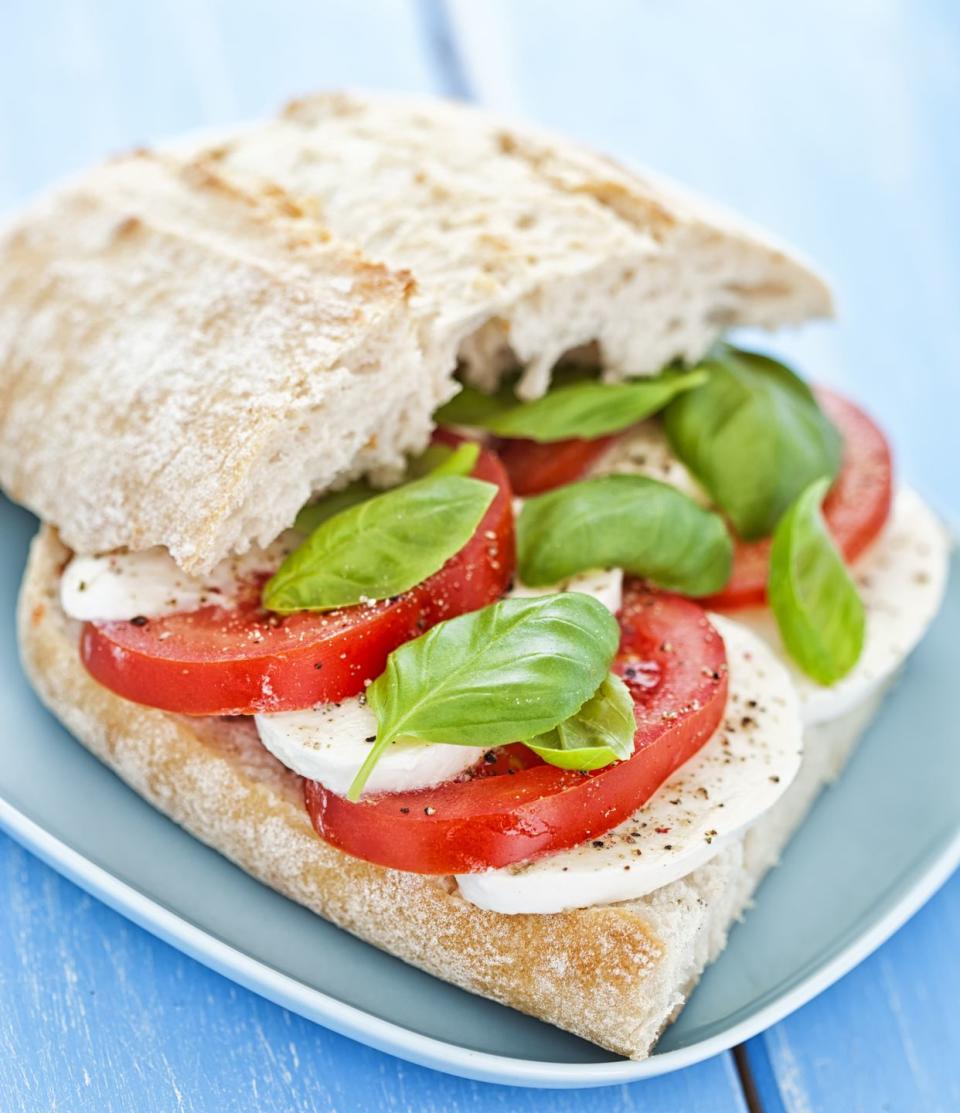
Day 3
Breakfast
Today, make our Chive and Goat Cheese Frittata recipe. Eat half of the frittata now, and refrigerate the rest for tomorrow's dinner. Enjoy with a watercress side salad and an 8-ounce latte with skim or unsweetened soy milk.
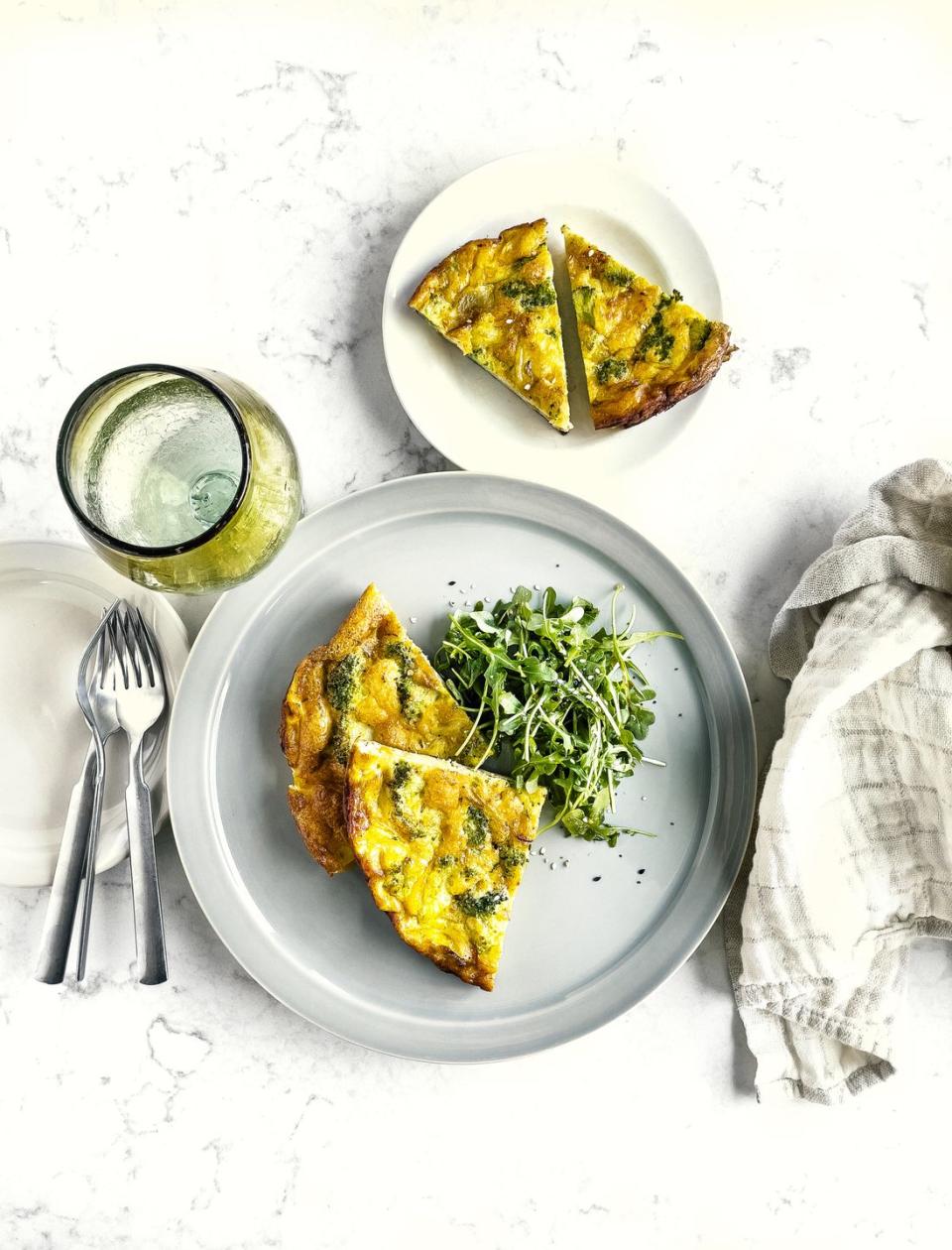
Lunch
Spread 2 slices of whole-wheat bread with 1/2 avocado and stuff with 3 ounces sliced turkey breast, 5 artichoke hearts, and as much sliced red pepper as you want. Serve with a cup each of baby carrots and grapes.
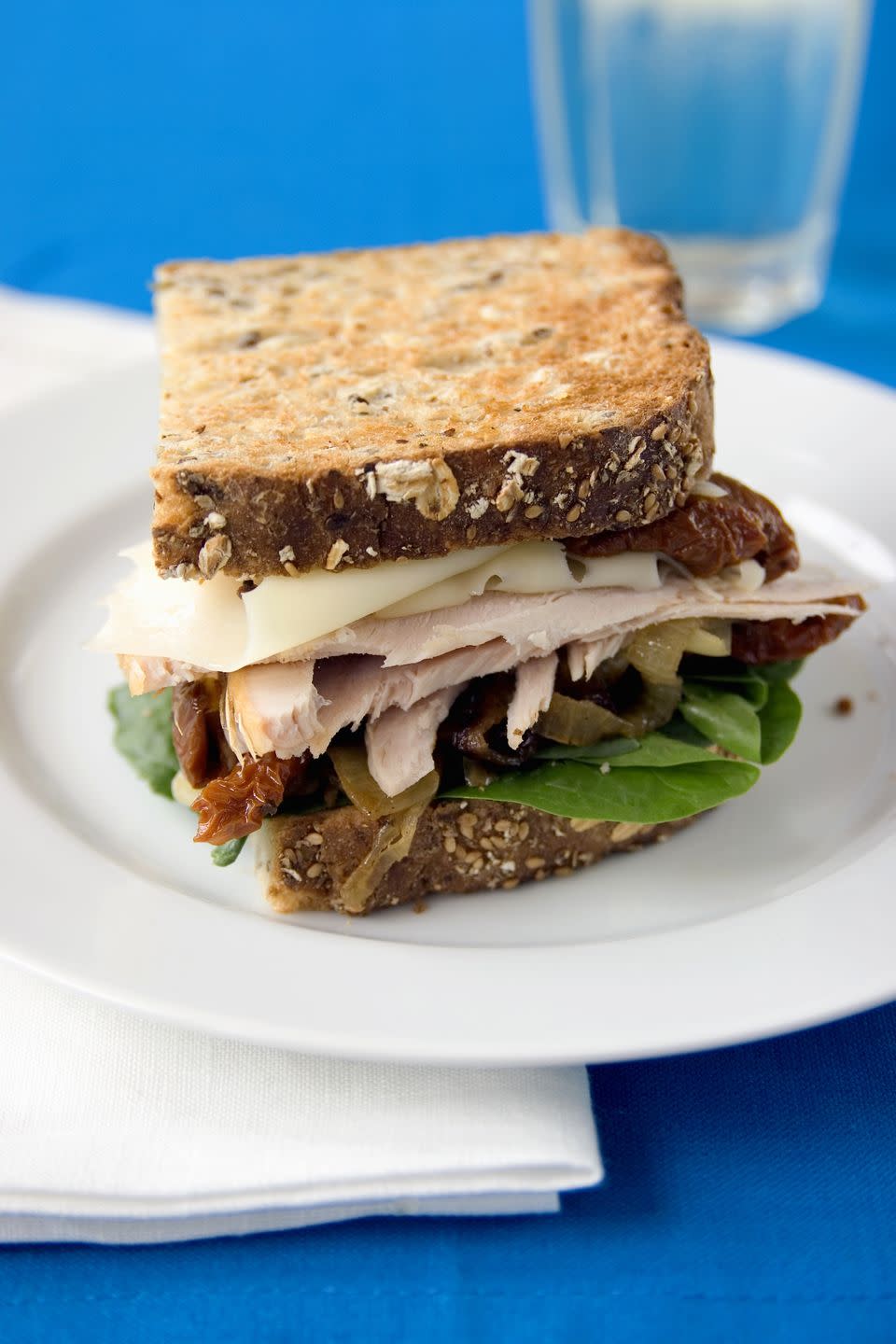
Snack
Use remaining hummus from earlier in the week. Bring along sliced crudité plus a 1-ounce piece of cheese.
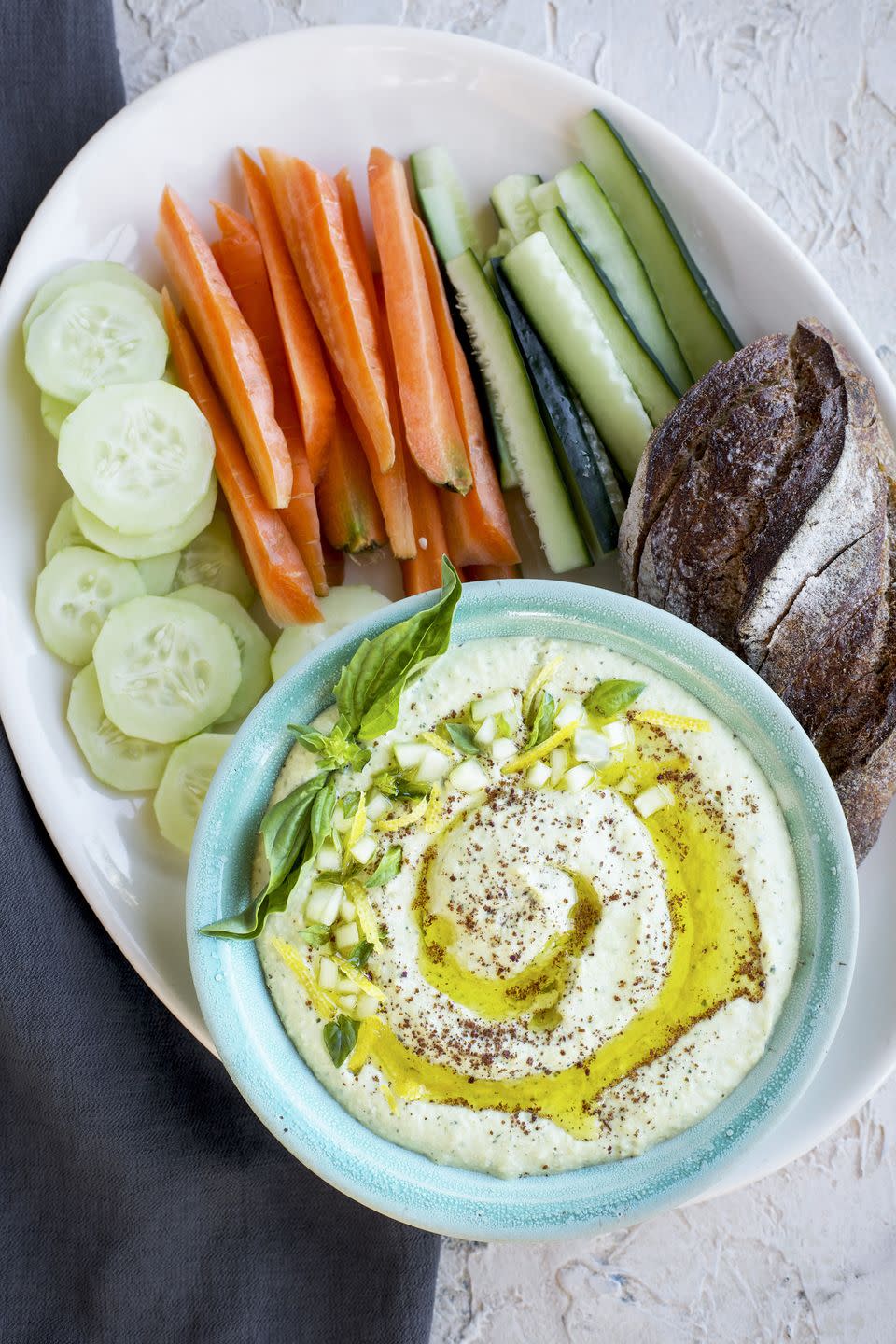
Dinner
Today, make half of our Mediterranean Grilled Sea Bass recipe and reserve half of that for tomorrow's lunch. Increase your vegetable intake by serving half a bag of baby arugula leaves with this meal (save the other half for tomorrow). Add an ear of corn and 1 cup cooked sugar snap peas topped with 2 teaspoons butter on the side. For dessert, have one frozen fruit popsicle (about 80 calories or less).

Day 4

Breakfast
Make 1 cup of oatmeal (like Good Housekeeping Nutritionist-Approved McCann's Irish Oatmeal) and add ? cup milk and hot water as desired. Serve with 1 cup fresh berries and sprinkle of cinnamon. Add a drizzle of raw honey for sweetness if needed.
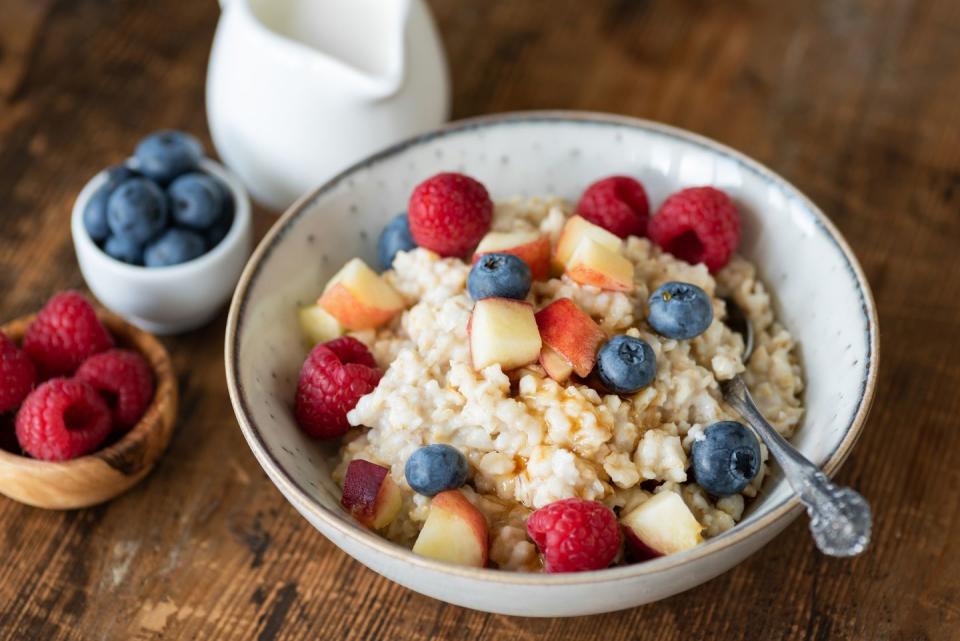
Lunch
Serve remaining sea bass from yesterday's dinner over rest of the baby arugula leaves.
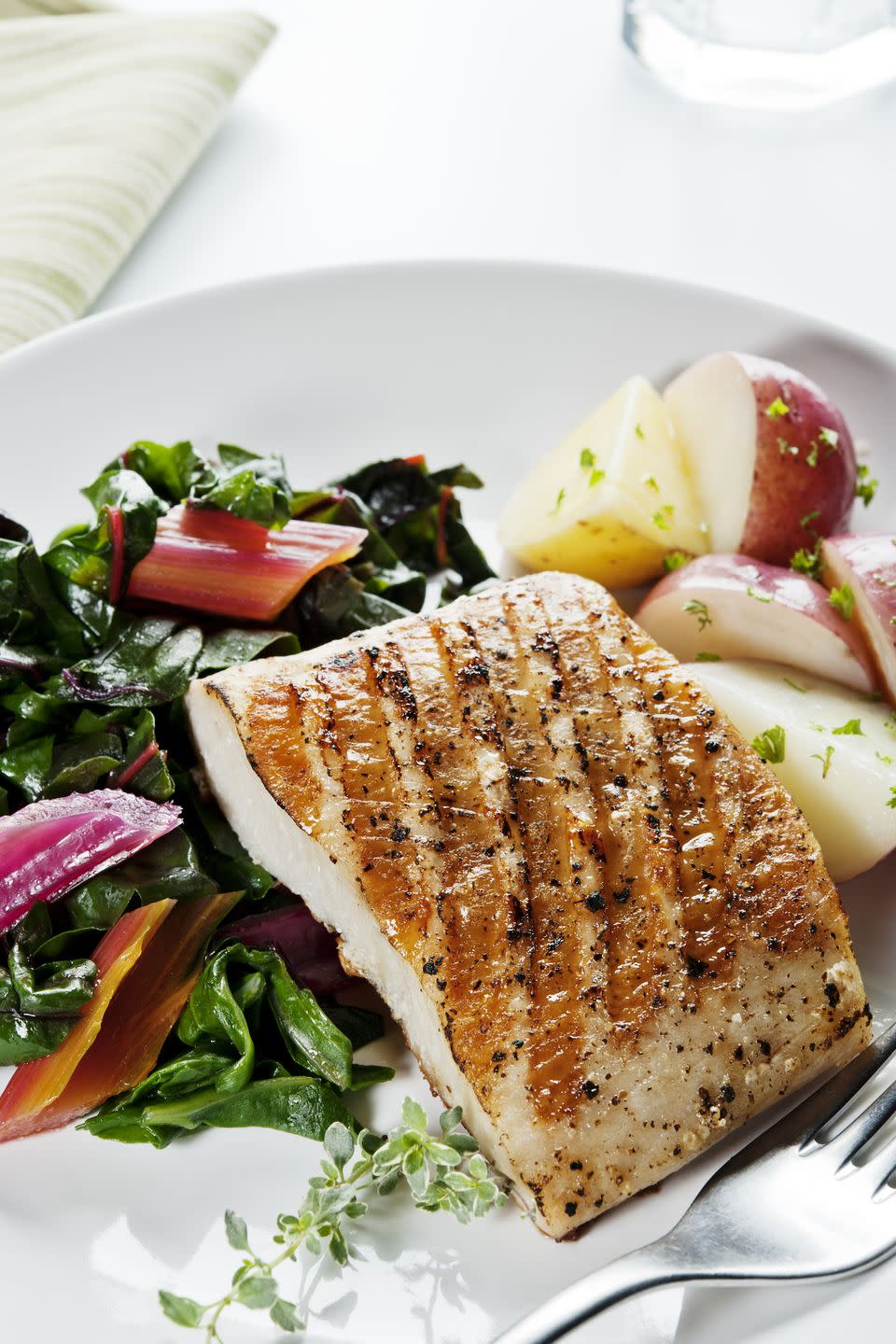
Snack
Mix 1/2 cup 0% plain Greek yogurt with 1 tablespoon light maple syrup and 1/4 teaspoon vanilla extract. Dip fresh crudité in this sweet, creamy dip.
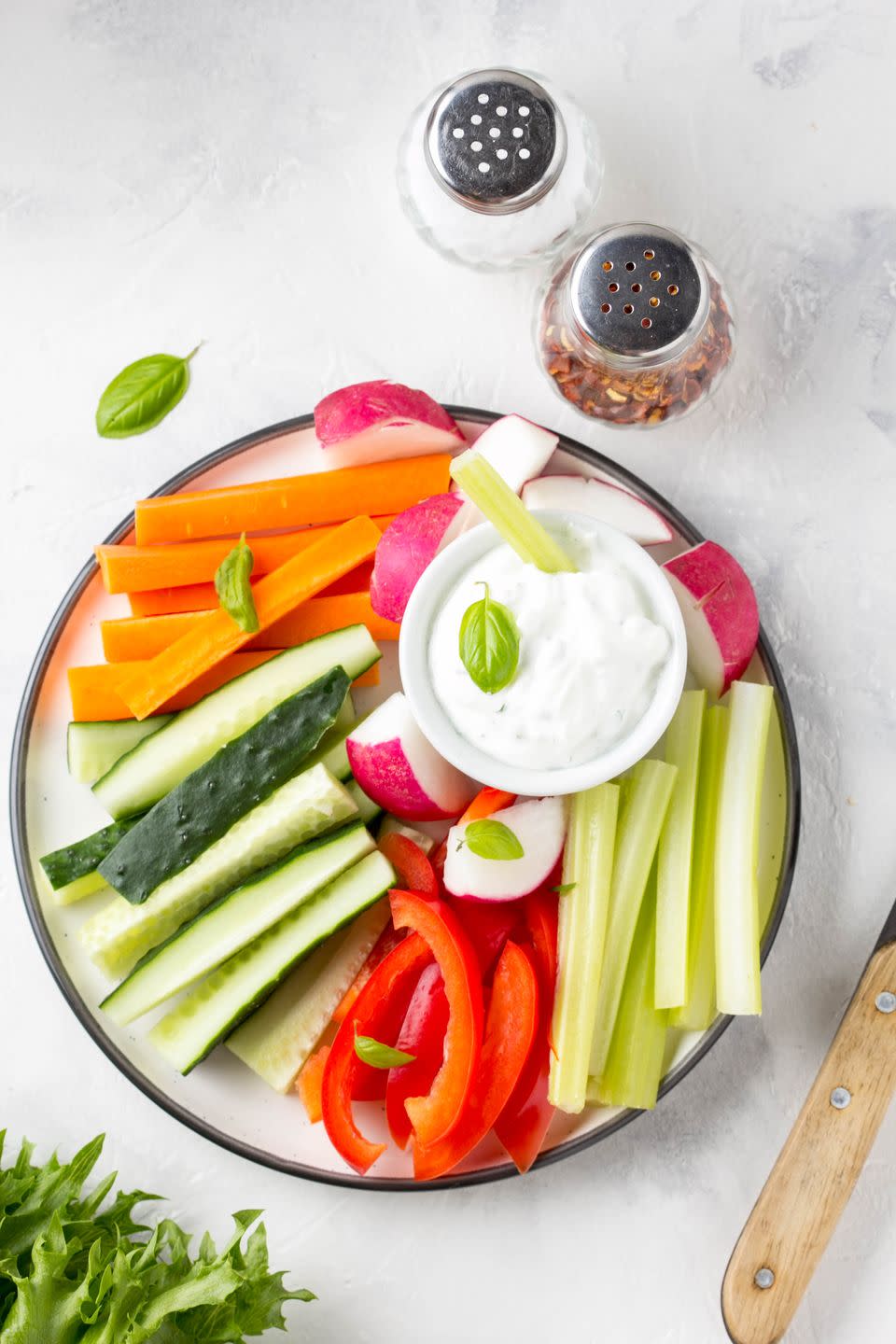
Dinner
Have the rest of the frittata from yesterday's breakfast. Serve with 2 cups baby spinach leaves, topped with 2 tablespoons balsamic vinegar, and 1 cup fat-free milk. Have one slice of whole-wheat toast topped with 2 teaspoons butter. For dessert, have a single-serve ice cream, like a Magnum Mini Bar.
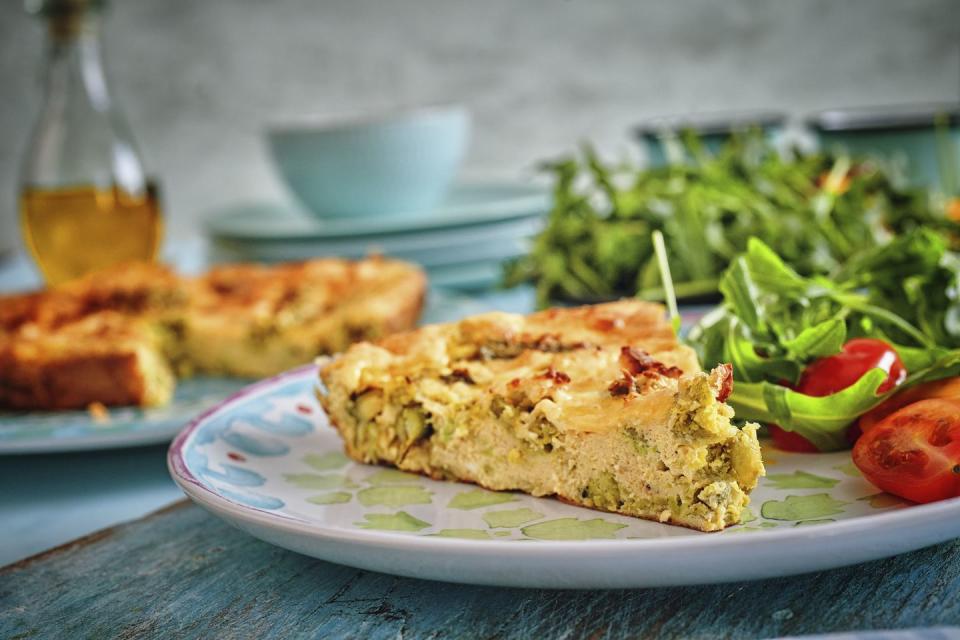
Day 5

Breakfast
Top 2 slices of 100% whole-grain bread with 2 tablespoons of nut butter and 1/2 sliced banana. Sprinkle on a little cinnamon for extra flavor.
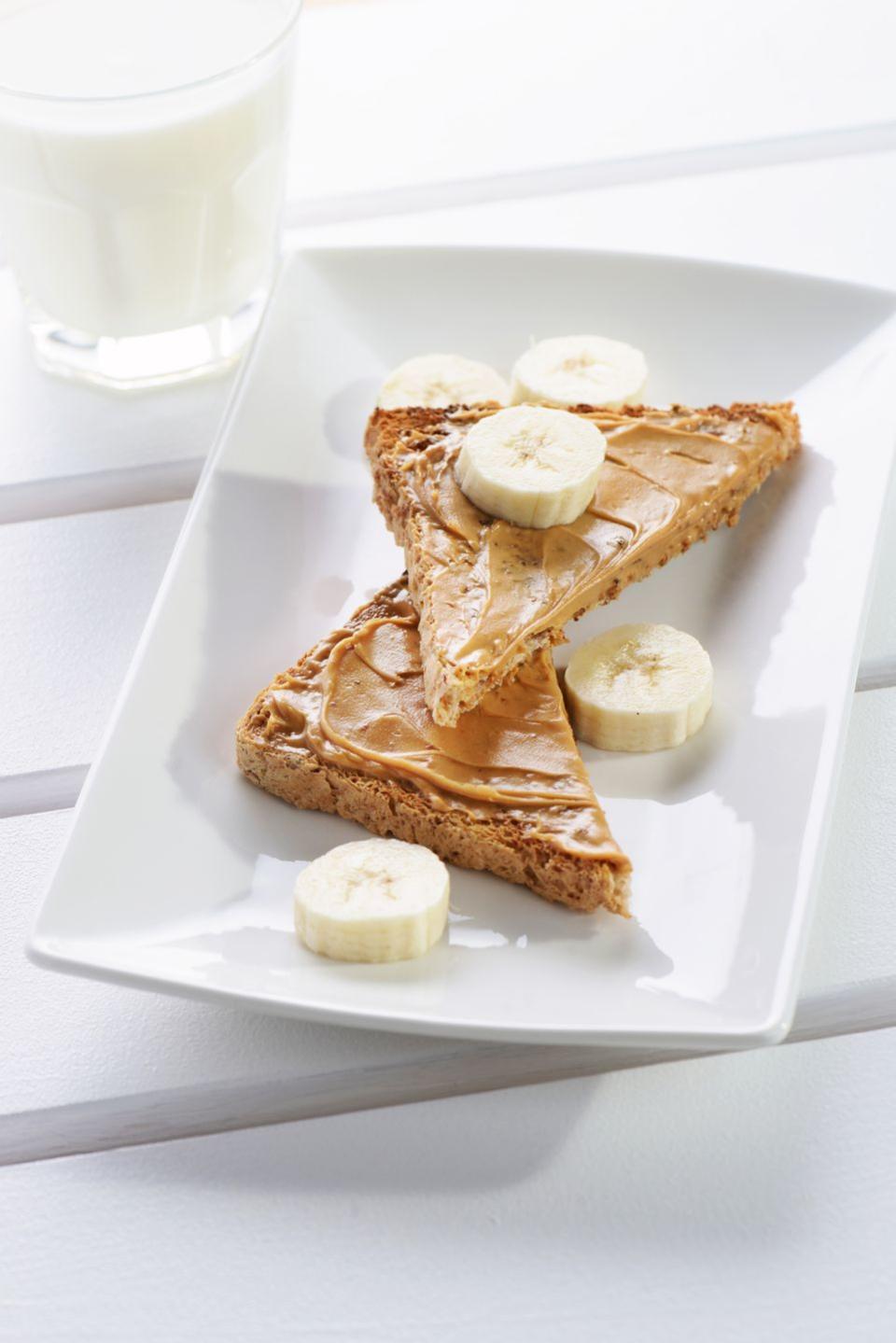
Lunch
Mix together 1/2 cup 2% Greek yogurt with 1/2 finely chopped cucumber, 1/2 minced garlic clove, and a shake of salt and pepper if desired. Spread half of yogurt sauce (save remaining sauce for later use) on a 100% whole-grain sandwich thin or pita and eat with 1 cup or more of veggies.
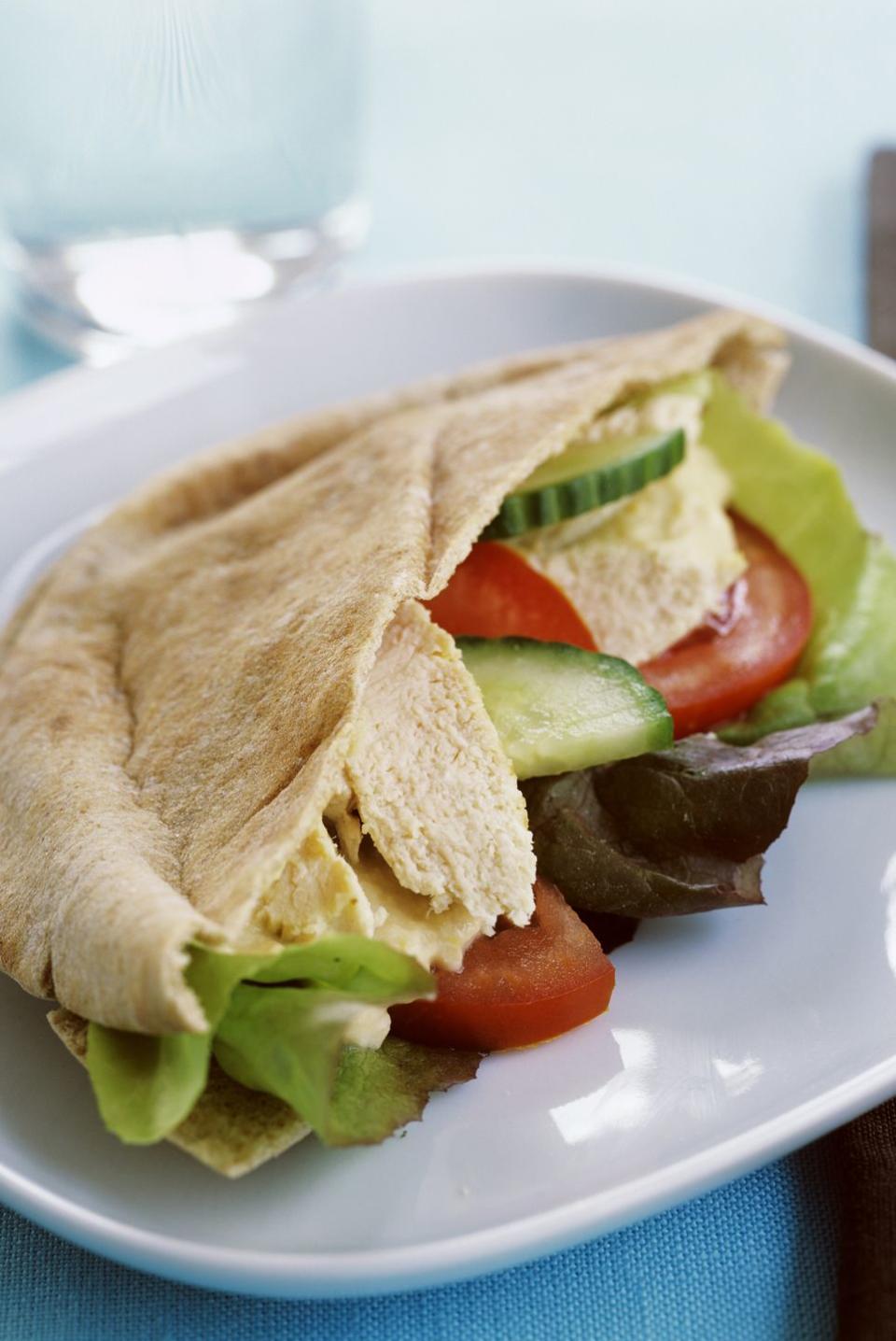
Snack
Munch on a 1.5-ounce bag of roasted chickpeas, like Biena Honey-Roasted Chickpea Snacks.
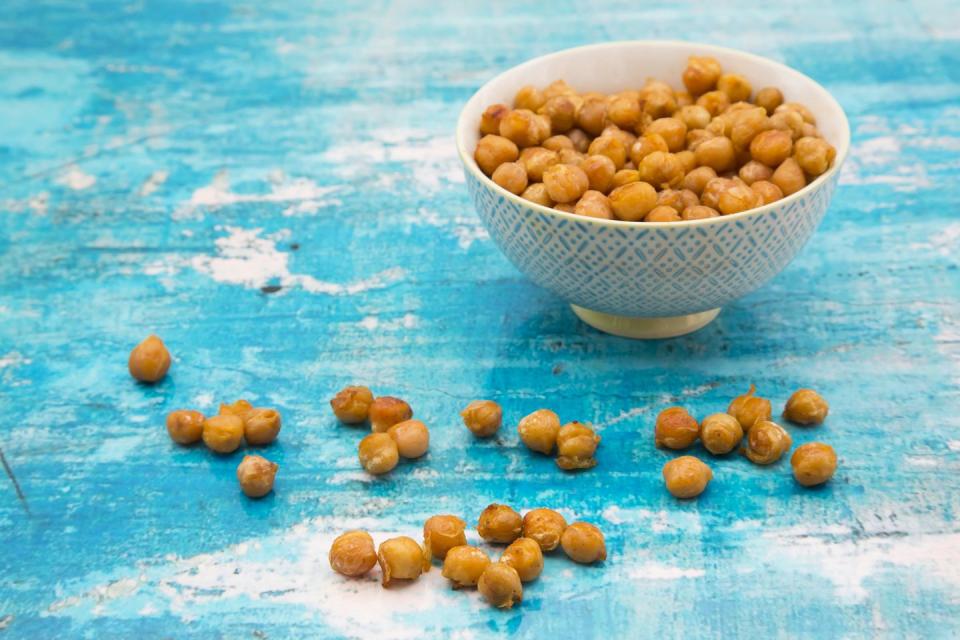
Dinner
Make our Mediterranean Sweet and Sour Chicken recipe and eat 1 serving. Serve with 1/2 cup cooked brown rice topped with 2 teaspoons butter. Enjoy with a glass of wine.
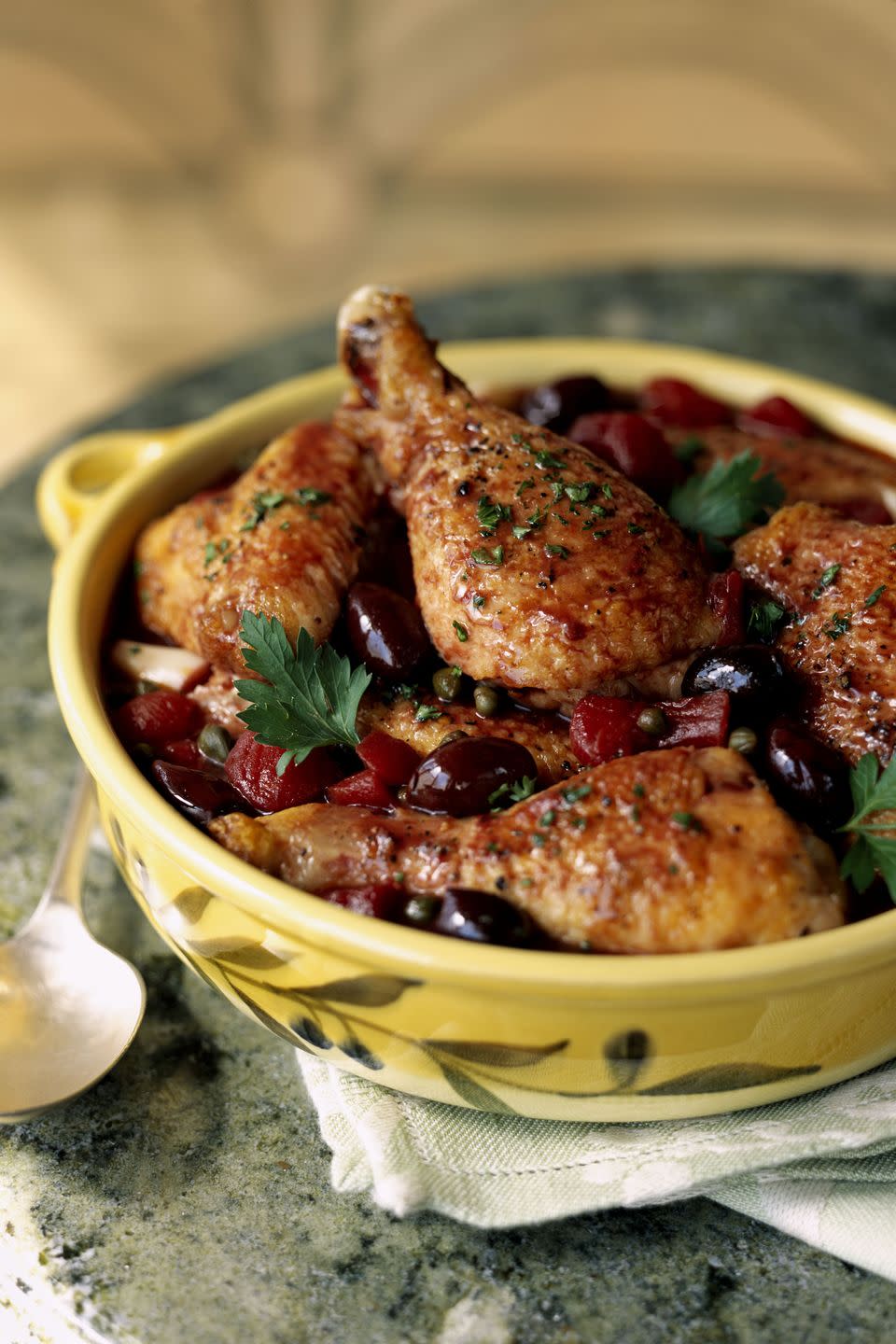
Day 6

Breakfast
Whip up 2 eggs any style with 1/3 sliced avocado and 1 piece 100% whole-grain bread.
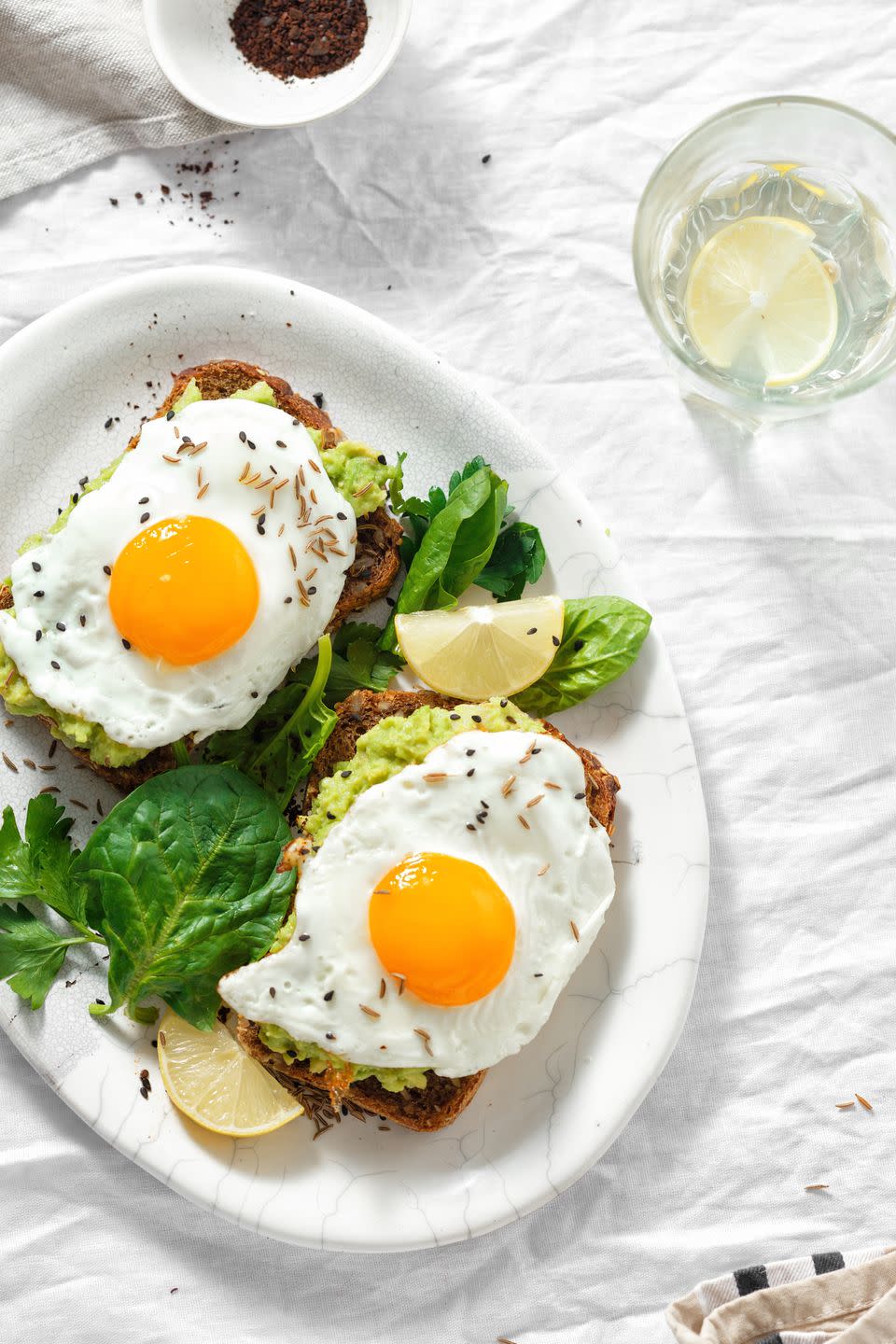
Lunch
Top 1/2 of a cauliflower pizza crust with tons of veggies (leftovers or whatever you feel like) and 1/2 cup of part-skim shredded cheese. Eat with a green salad (at least 2 cups) topped with 2 tablespoons regular dressing, any variety. For dessert, have one scoop of your favorite ice cream in a plain cone.
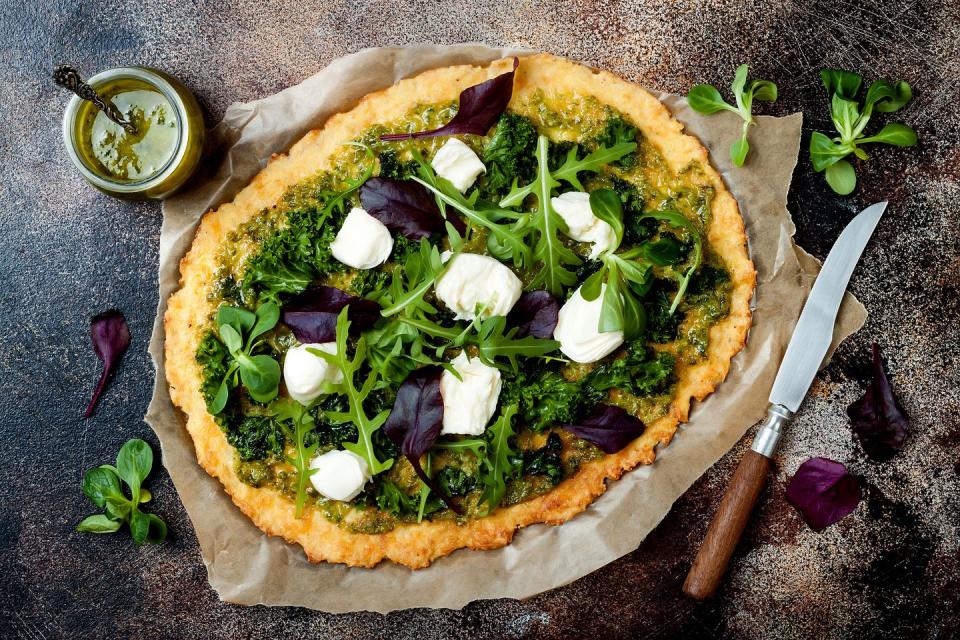
Snack
Combine 1/2 fresh orange and 1/2 cup pineapple chunks (fresh or canned and drained) with 6 ounces Greek yogurt for a fruity smoothie. Blend in a food processor or blender, dropping in ice cubes as desired.
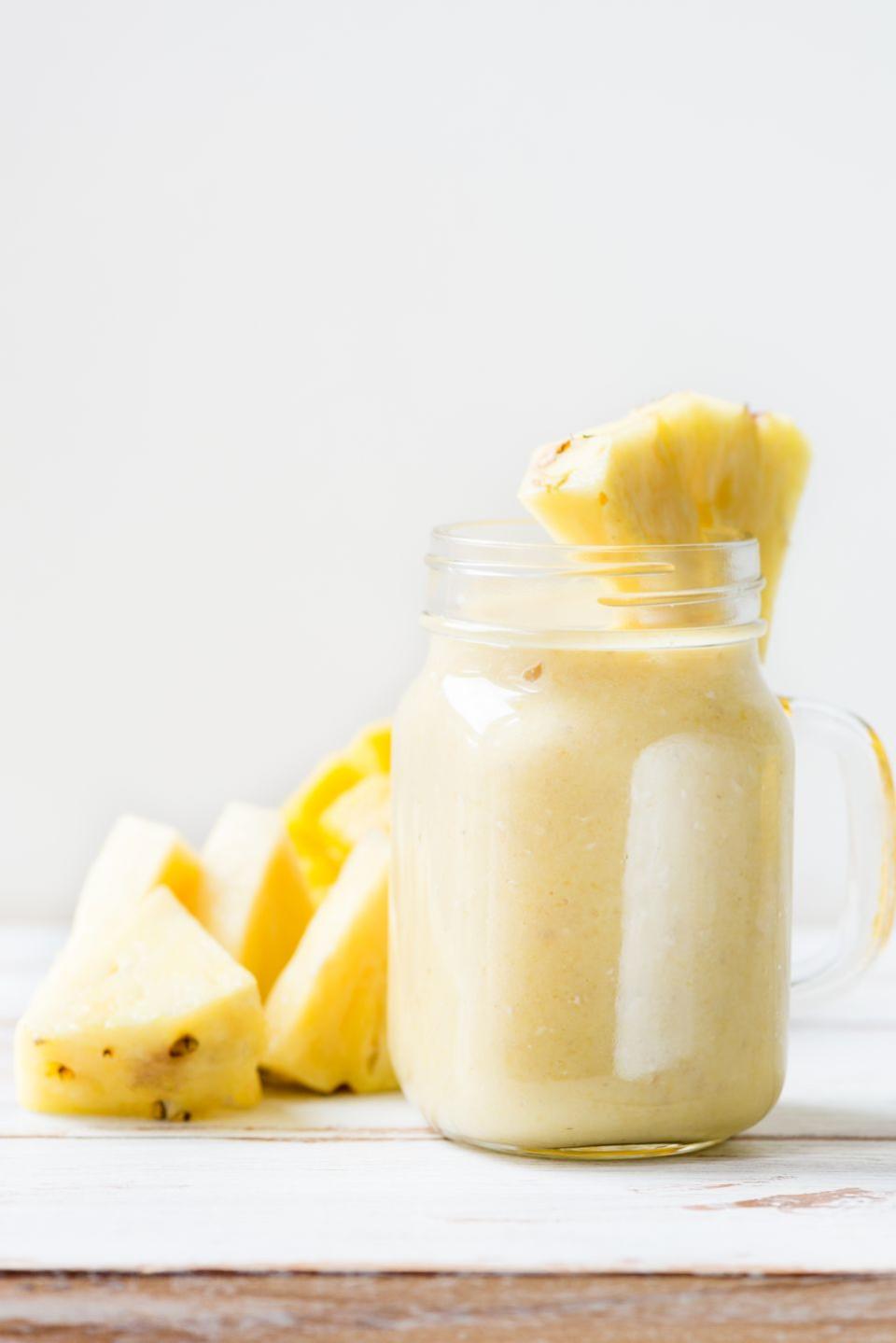
Dinner
At your favorite Greek restaurant, order sautéed or grilled shrimp or salmon with an extra order of veggies. Split an app with your table and skip the bread basket. Enjoy with a glass of wine or spirits on the rocks.
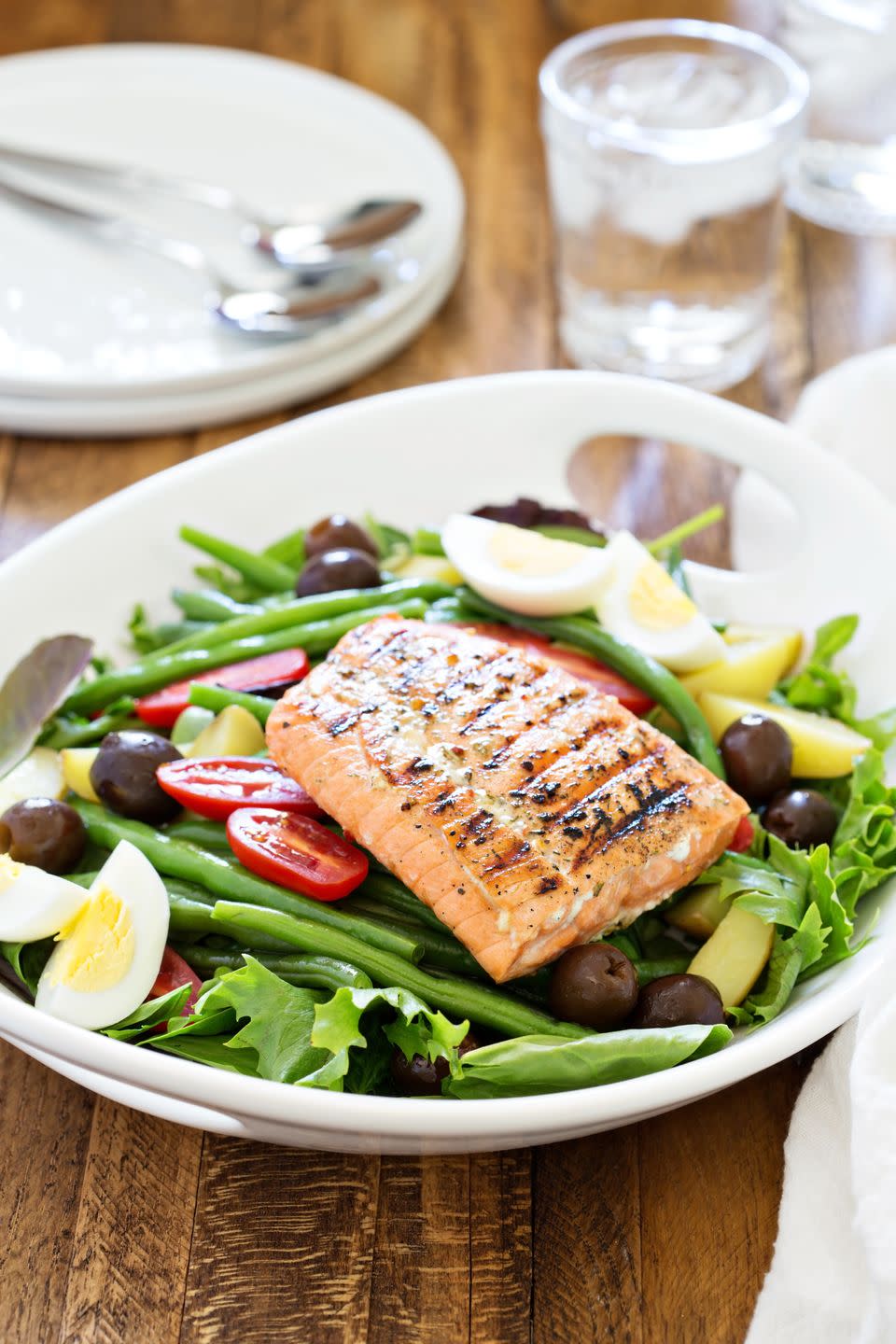
Day 7

Breakfast
Top a 100% whole-grain bagel thin with 1/3 cup fat-free ricotta cheese mixed with 1 tablespoon each peanut butter and honey. Sprinkle 1 tablespoon raisins on top.
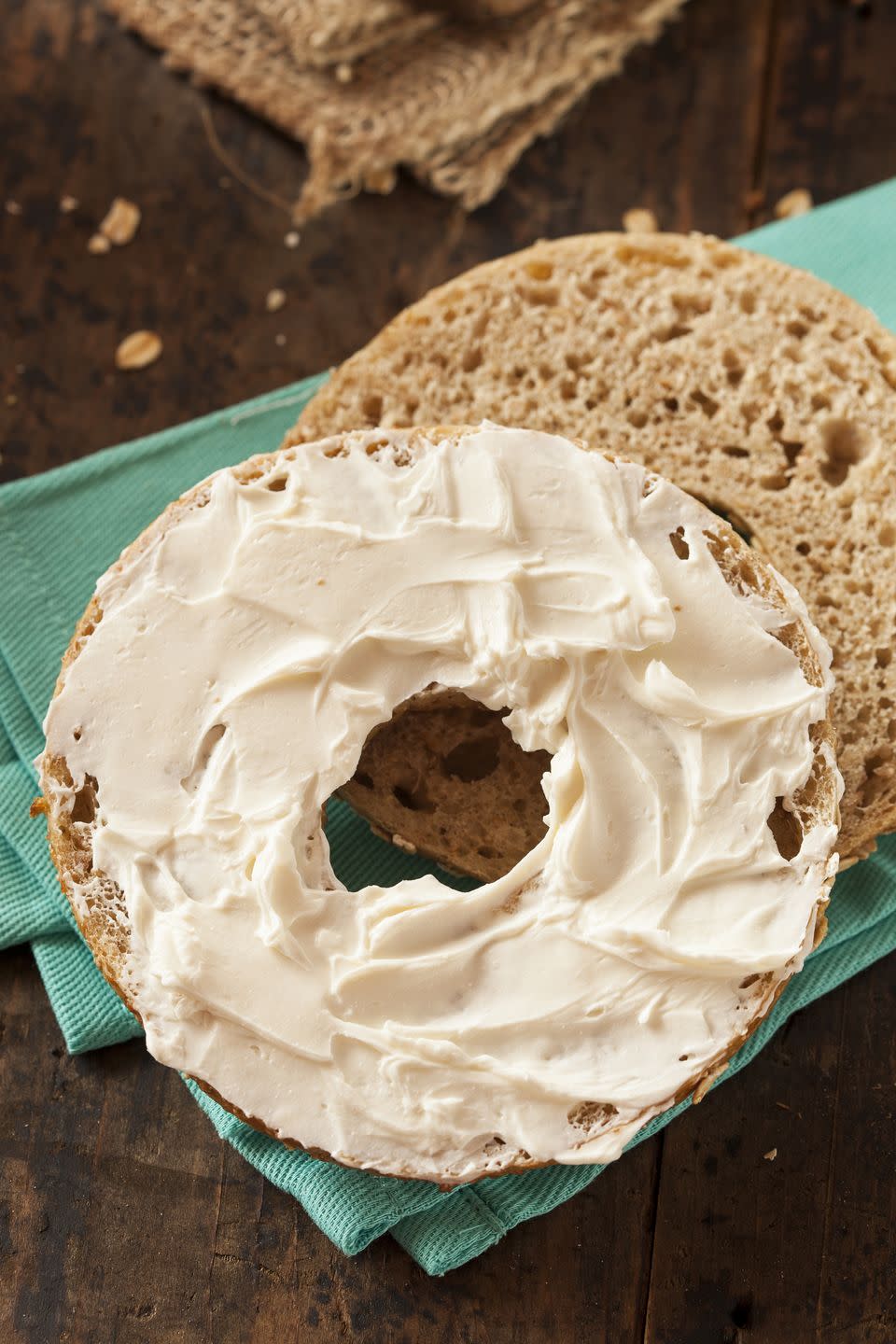
Lunch
Make our Wild Rice and Spinach Egg Bowl recipe. Grab a skillet and cook one egg, then add 2 cups spinach and season with salt and pepper. Serve on top of multi-grain rice.

Snack
Nosh on 1 ounce nuts, such as Good Housekeeping Nutritionist-Approved favorite Wonderful Pistachios, almonds, cashews or peanuts.
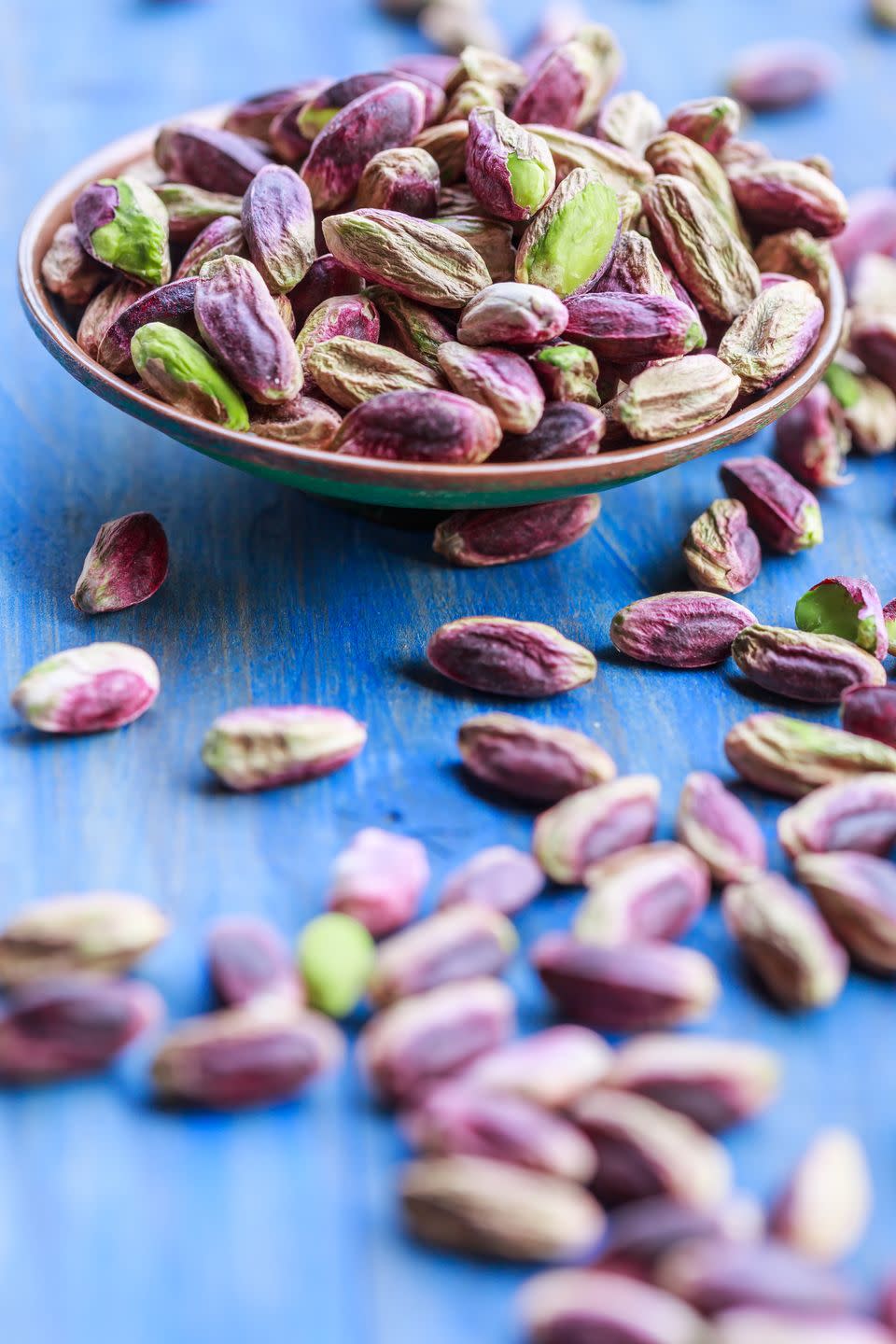
Dinner
Marinate 6 ounces of shrimp in a basil marinade for at least 30 minutes or overnight. To make basil marinade, whisk together 1/4 cup white wine vinegar, 1 teaspoon olive oil, 1 tablespoon lemon juice, and 1/8 cup chopped fresh basil or 1 teaspoon dried basil.
Grill shrimp until cooked through. Top 2 cups of romaine lettuce with the shrimp and mix well into greens for added flavor. Serve with 1 cup blueberries and enjoy 1 ounce chocolate (about 4 Dove Miniatures) for dessert.
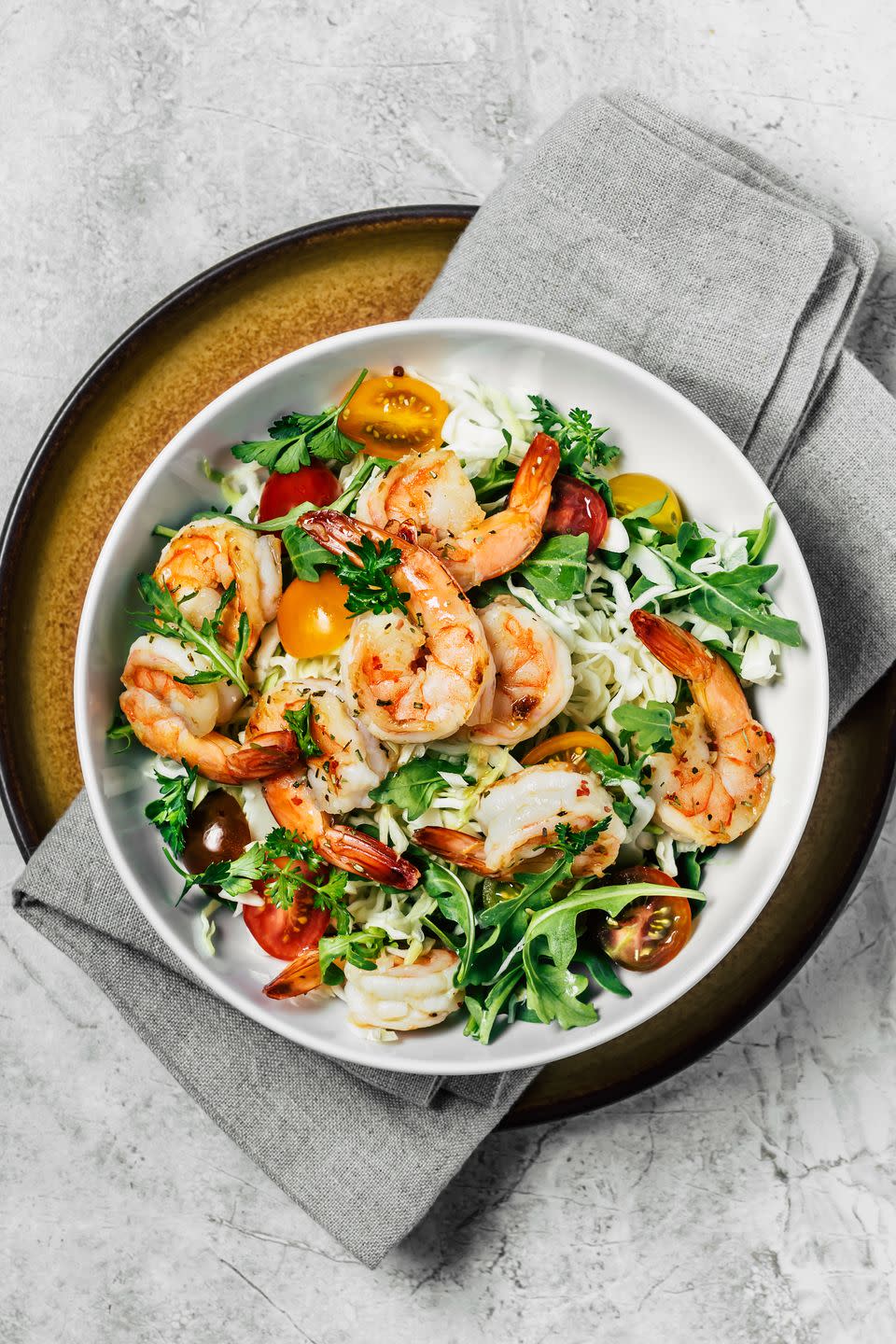

The 28-Day Mediterranean Diet
Looking for more? Try Good Housekeeping's 28-Day Mediterranean Diet and get 60+ recipes for delicious, nourishing meals from the Good Housekeeping Test Kitchen and the GH Institute Nutrition Lab. Our 28-day plan allows you to skip the counting and planning and get straight to the good stuff: Triple-tested, nutritionally balanced recipes, daily meal plans, shopping lists and science-backed tips.
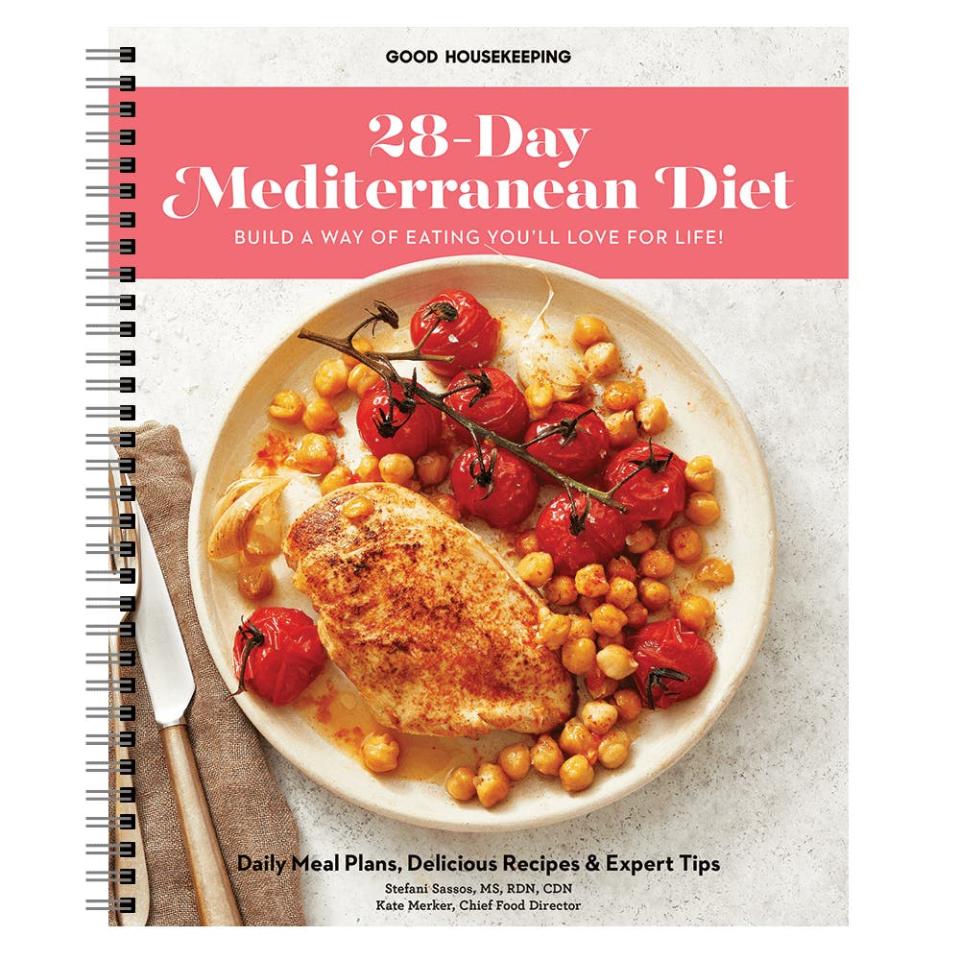
The 28-Day Mediterranean Diet
goodhousekeeping.com
$25.95
You Might Also Like
